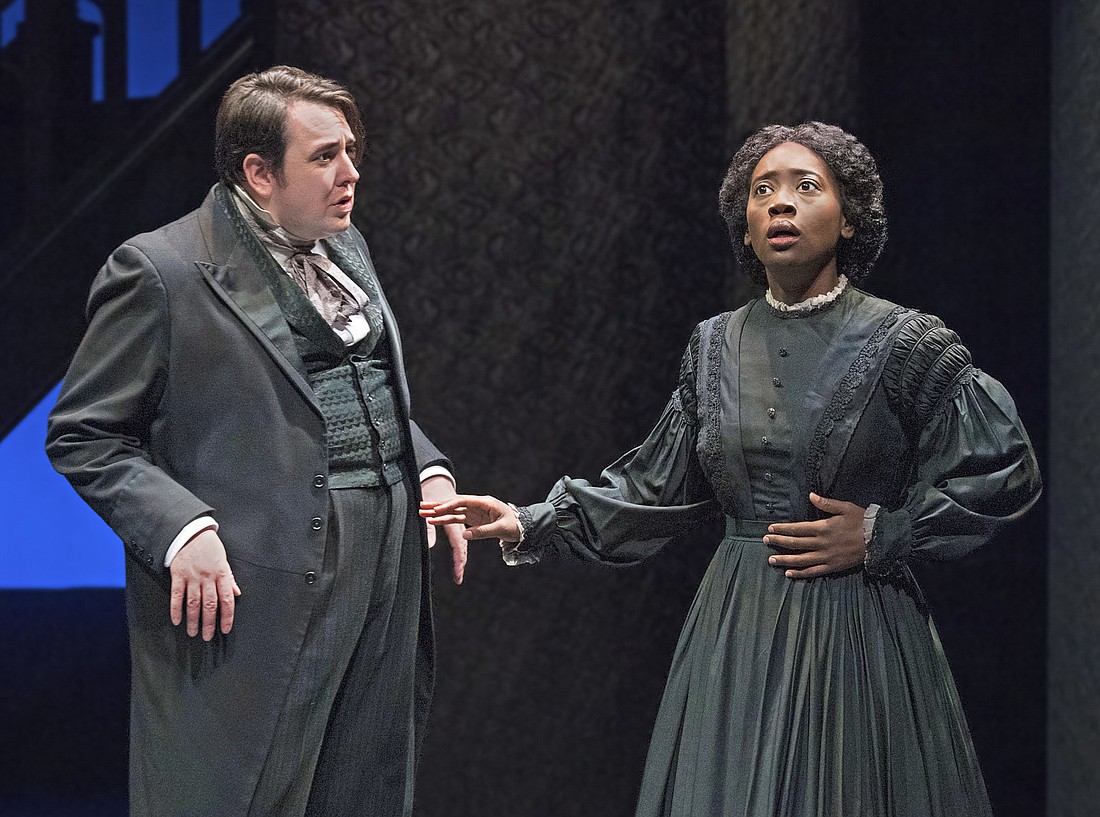- April 25, 2024
-
-
Loading

Loading

Henry James’ 1898 novella, “The Turn of the Screw,” was ahead of his time.
The prolix author ignored Victorian ghost story conventions — and reinvented the genre in the process. Ironically, his scary tale might be entirely ghost-free. It’s a riddle literary critics still fight about today …
When is a ghost story not a ghost story?
When James wrote it.
Playwright Jeffrey Hatcher puts a fresh spin on James’ shaggy ghost story with his 1996 stage adaptation. He doesn’t answer its core riddle, but adds a few new terrifying conundrums.
The terror begins … with a job interview.
Stately Bly Manor needs a new governess. The wealthy lord of the manor grills an unnamed woman applying for the position. He’s the guardian of his late brother’s orphaned children: 10-year-old Miles, and 7-year-old Flora. Sadly, this confirmed bachelor detests kids. The job is hers, if she never bugs him about his charges. The woman agrees — and gets the job.
And what a job it is.
The kids are a handful. Miles has been a naughty boy. His boarding school just expelled him for unspecified dirty deeds. Flora’s endured some unknown trauma that’s rendered her speechless. Both kids are damaged goods. To make matters worse, the villains who hurt them are two of the manor’s former employees: Quint (the previous butler) and Miss Jessel (the previous governess).
While alive, these rotters had an openly sexual relationship, and traumatized the children by making them watch. Quint and Jessel are as dead as Dickens now. But their ghosts start popping up, and luring Miles and Flora into dangerous situations. The hellish fiends clearly want something from the kids. Something unspeakable. The new governess figures this out and fights back. She won’t surrender the kids’ souls without a fight. Or so it seems. But there’s an alternative explanation …
The “ghosts” might be hallucinations in the governess’ overheated mind.
Director Chris Clavelli honors the story’s underlying dynamic. Everything starts out nearly normal, and then gradually gets weirder. (The story’s title is “The Turn of the Screw,” after all.) Clavelli delivers on the slow-building terror that implies.
DeAnna Wright’s Governess is goodhearted, heavenly minded, and not worldly wise. Her character is sympathetic and often heroic. She’s alone and far from home, in a new environment, in her first job as a governess. Despite the horrors she encounters, she soldiers on. Her intensity works, except for a few scenes where she could take it down a notch.
The mercurial Brian Owen plays all the other characters. Subtle shifts of accent and body language transform him into the pompous narrator, the bratty boy, the terrified girl, the overbearing lord, the sweet housekeeper, and the terrifying specters. Owen is a great shapeshifter.
Steven Kemp’s set is almost bare — apart from a red, leather chair and a dark, wooden stairway, revealed in crosshatched shadows worthy of a German expressionist movie. David Covach’s funereal costumes are as black as a blank slate — a void for your imagination to project its fears. Alex Pinchin’s sound and Michael Pasquini’s lighting are fittingly spooky without overplaying the fear factor. You never feel like you’ve stepped inside the Haunted House ride at the county fair.
The play itself is a great ride.
Bluntly put, Hatcher is far more entertaining than James. The contemporary playwright is great at scene construction, suspense and getting to the point; the Victorian novelist wasn’t. Hatcher also takes liberties with the source material, and spells things out that James kept vague. Does he go too far? Literary critics can argue about that, too.
Whatever their verdict, the results are entertaining.
This might not be a ghost story. But it’s a scary story.
Before the dubious ghosts appeared, flesh-and-blood monsters did the damage. They were all-too real, and all-too-human.
Those monsters are always the worst.